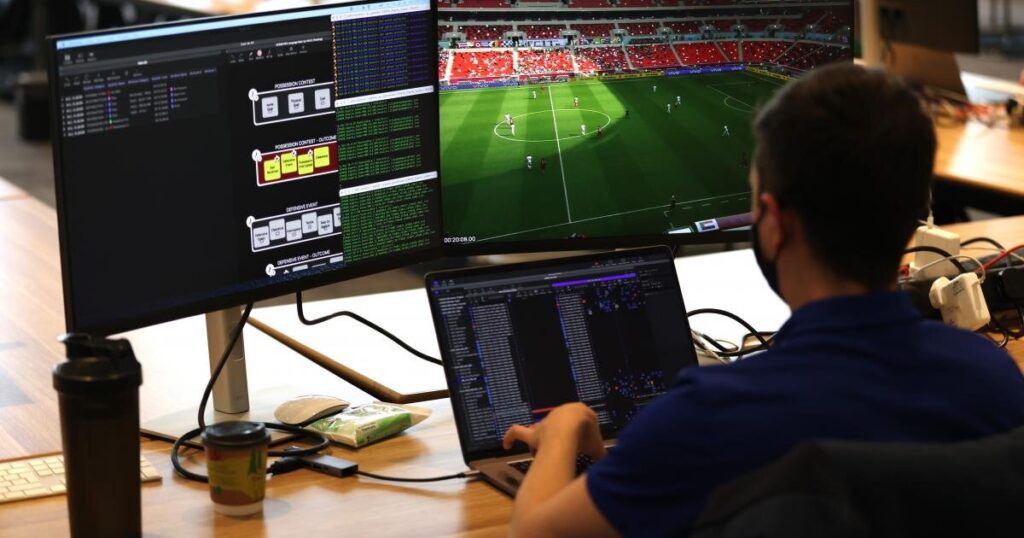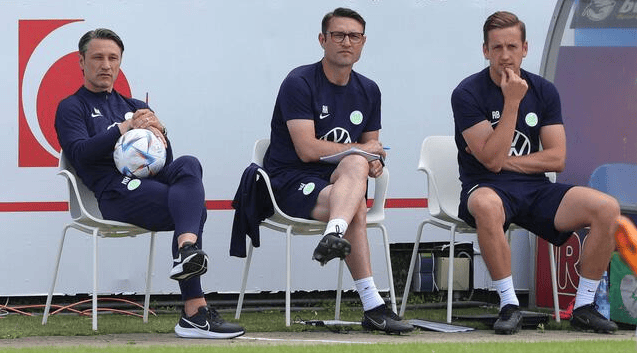Throughout history, coaches have often overlooked or even resisted the insights provided by a performance analyst. The biggest challenge that any coach or manager has to deal with in a game is the unpredictable nature of the sport. Coaches build their game models, train their players in different scenarios, create habits in attack and defense, and try to equip them with as many solutions as possible to deal with any situation they will face.
If football was played by robots, I’d win everything
Marcelo Bielsa
Table of Contents
Disclosure: Please note that some of the links below area affiliate links and at no additional cost to you I will earn a commission. Know that i only recommend products services and brands i have personally used and stand behind. When you use one of my affiliate links, the company compensates me, which helps me run this blog and keep my in -depth content free of change for readers (like you). Read our disclosure for more info.

Elevate Your Coaching Journey
Are you ready to take your coaching career to the next level? Look no further than FootballCoach365, your ultimate destination for top-notch coaching material.
Join the Coach’s Corner today and experience the transformative power of proper planning, training and coaching.
Making the unpredictable predictable
So, how can a coach make the game as predictable as possible? If coaches could anticipate how the opponent will react in every situation, and if they understood the strengths, weaknesses, and habits of all 22 players on the pitch, they could design a strategy and game plan that would lead to success. This is where analysis becomes crucial. Video and data analysis are tools considered essential for every club seeking success. But who is the appropriate person to conduct the analysis, extract results, present them in an understandable way, and train them? Analysts with a high level of tactical understanding and football knowledge fit this role. However, transferring these results onto the pitch requires coordination. While the head coach and their assistants are responsible at a collective level, individual and group improvements within the team may require additional attention. Coaches and assistant coaches are often overwhelmed with other duties and responsibilities. This is where the role of the Coach/Performance Analyst becomes essential.
Edin Terzić’s journey to the top level of European football is a narrative of determination, tactical details, and a deep connection with Borussia Dortmund. He is the proof that there are different pathways to becoming a coach and starting from scouting and analysis is one of them. Terzić started his coaching career as a scout, analyst, and youth coach, slowly climbing the ranks. His tactical knowledge, his deep understanding of football, and his understanding of the game were evident early on, and he quickly became known for his ability to develop young talent.

So, what is the new need that has emerged in modern football? What is the new role that is gaining lots of attention recently?
The role of the coach/performance analyst
The new professional role that lots of top clubs have started to include in their staff is the role of coach/performance analyst. Team performance analyst should serve as a tool to develop both individual and team performance. Utilizing video feedback, we can gain a deeper understanding of tactics and decision-making processes, thus facilitating improvements in performance. Reviewing past performances and employing positive reinforcement are essential aspects of performance analysis, ensuring that future performances maintain positive trends. While it can address mistakes, I’ve observed that players tend to respond more favorably to positive imagery rather than negative imagery. Performance analysis is even more effective when combined with targeted individual or group training conducted by the same person or group who have completed the analysis and understand precisely what improvements are needed to enhance performance.
Is the coach/performance analyst simply another niche role emerging in the modern era, or are they essentially coaches with a deeper understanding of analysis? Are we witnessing a merging of roles at the highest level, where coaches and analysts become indistinguishable?

The role of the coach/performance analyst in modern football has become increasingly significant as the sport evolves. The integration of data analysis and sports science into football has revolutionized the way teams prepare for matches, assess player performance, and develop tactical strategies.
Coach/performance analysts, equipped with advanced software and analytical tools, are using massive amounts of data to provide insights that were previously unattainable. They can record players’ and teams’ development through training and match analysis, assisting in creating individual and subgroup development programs, and liaising with a club’s academy or first-team staff on the strengths and weaknesses of players using data.
The modern coach/performance analyst is not just a passive observer but acts as an extension of the manager, translating complex data into actionable insights that can influence decision-making before, after, and during matches. This requires a deep understanding of the game, a keen eye for detail, and the ability to communicate effectively with coaching staff and players but also the skills to train them on the pitch either on defending or attacking actions.
Reading the numbers
Let’s consider an example: Who is the best forward in the Premier League? A common approach is to view the table of top scorers. Erling Haaland leads with 25 goals, followed by Cole Palmer with 21, Alexander Isak with 20, Dominic Solanke with 19, and Ollie Watkins also with 19 goals. But what defines the “best forward”? Is it the highest goal scorer? The most efficient? The one involved in the most goal-scoring opportunities? This prompts further questions. What are the primary characteristics of a forward? Is it accuracy in shooting? One-touch finishing ability? Is Jesus of Arsenal a top center forward?
Consider this: Erling Haaland needed 26.36 expected goals (XG) to score his 25 goals. This suggests he performed as expected based on the quality chances he received. However, if we compare this to Cole Palmer’s 16.09 XG, the difference is substantial. Palmer consistently overperforms, converting unexpected opportunities into goals. His unexpected goal contributions have significantly impacted his team, such as Chelsea, elevating them to the top seven, a feat they might not have achieved without him.
To further contextualize, here are the XG numbers for all the top five forwards:
- Erling Haaland: 25 goals, 26.36 XG, -1.36
- Cole Palmer: 21 goals, 16.03 XG, +4.97
- Alexander Isak: 20 goals, 15.91, +4.09
- Dominic Solanke: 19 goals, 20.34, -1.34
- Ollie Watkins: 19 goals, 17.68, +1.32
Knowing the above information, a coach/performance analyst would proceed as follows. Let’s consider a scenario where the performance/coach analyst is working with a team and their forward has scored 17 goals (a worthy achievement), but the expected goals (XG) are 21.04, indicating a shortfall of -1.04, suggesting the player struggles with efficiency in converting clear chances into goals.
The next step for the coach/performance analyst would involve reviewing all the chances the player has been involved in since the beginning of the season to identify potential issues affecting their finishing. Subsequently, the coach analyst would compile a short video containing representative clips and present them to the player for discussion. Following this, they would engage in a conversation about designing a personalized training program to address the identified areas for improvement over the next weeks. The final step is for the player and the coach analyst to have one or two short training sessions over the next 2-3 weeks to improve the specific areas they have discussed.
Prior to the meeting with the player, the coach analyst would discuss their findings with the head coach to inform them and collectively decide on the best course of action. This analysis would be revisited after one month to evaluate the player’s progress.
In the context of tactical innovation, the coach/performance analyst plays a pivotal role. They are responsible for identifying patterns in the opponent’s play, understanding the dynamics of player movements, and suggesting tactical adjustments. The rapid growth of the analysis sector in football has made it essential for teams to employ dedicated analysts who can keep up with the latest tactical trends and technologies in the sport.
Mehmet Scholl, after the 2022 World Cup was speaking to German BILD:
I think that Flick was driven crazy at the World Cup by his assistant coach Röhl, who constantly distracted him with the iPad. Hansi lost track a bit because he trusted the wrong man.
Mechmet Scholl
But, Scholl is a “former coach”. Football is changing every day.
The evolution of the modern football coach involves a dive into experience, and tactics relating to football science to keep ahead of the game. Football coaching techniques are now a blend of experience, tactical insight, and the utilization of football science.
Furthermore, the globalization of football has brought about a diverse range of players from different cultural backgrounds, making the performance analyst role even more challenging and vital. They must possess tactical knowledge, analysis skills, be technologically updated, and, very importantly, know how to coach and train players. Their contribution during training session and games is valuable, and their impact on the team’s development and success is unquestionable.
Despite such skepticism, the role of analysts in coaching staff has evolved significantly. Figures like Tedesco, now Belgium’s head coach, have embraced analysts as integral members of their teams. This integration of analysis into coaching extends beyond individual clubs. Analysts like Aaron Briggs of VfL Wolfsburg and Richard Bredice of Burnley, have started from an analyst position and have transitioned to coaches with their managers across different teams, showcasing a growing trend in the sport.

Peter Krawietz’s journey from chief scout to Jurgen Klopp’s assistant at Borussia Dortmund and Liverpool is another bright example. Despite having never played football professionally, Krawietz was a prominent figure at Borussia Dortmund during an era of great success under his compatriot’s guidance. His adeptness in scouting and analysis earned him the moniker ‘The Eye’ from Klopp, and upon joining the Reds, he aimed to leverage that expertise in the Premier League.
Conclusion:
The importance of analysis in modern football cannot be overstated. As the game becomes faster, more intense, and tactically complex, coaches rely on coach analysts to dissect vast amounts of information, review the performance metrics and translate them into actionable insights for training and match strategies. The coach analyst has the skill to help with opposition scouting, to be a recruitment analyst but most importantly to be a coach on the pitch helping with the training.
Furthermore, analysts bring a fresh perspective to coaching staff, challenging traditional norms and fostering diverse thinking. This collaborative environment allows for constant refinement of tactics and player development.
In a sport where every detail counts, the partnership between coaches and analysts has become indispensable. From designing and delivering training sessions to refining match strategies, the evolution of this relationship signifies a significant progression in the coaching landscape.
In summary, the coach/performance analyst in modern football is a crucial figure behind the scenes, shaping the strategies that fans see on the pitch. Their work ensures that teams can compete at the highest level by making informed decisions based on comprehensive data analysis. The power of analysis in football coaching cannot be overstated, as it continues to provide a competitive edge, enhance tactical awareness, and optimize player performance.

